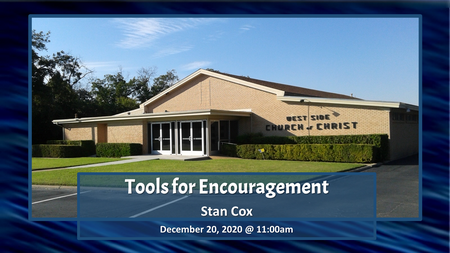Category: Exhortation
Subject: Exhortation
Mining the Scriptures: 1 Thessalonians 2:1-7

Paul wrote the Christians in Thessalonica to exhort them with the gospel of Christ. His initial visit in Thessalonica came in spite of the danger which his ministry left him in, a danger which led to their mistreatment and imprisonment in Philippi (cf. Acts 16). They would have been aware of that, as the beating of Paul and Silas would have been very recent.
So, it was evident that Paul had love for the faithful in Thessalonica.
How did Paul characterize his exhortation to them? It was not from error, uncleanness, or deceit. It was in response to the stewardship given him by God. It was not an attempt to flatter, or to gain an advantage. It was not to gain glory from men, not even from the Thessalonians themselves. It was not a usurpation of his authority as an apostle, a means of gaining any advantage. It was a gentle exhortation, the type a mother would have for a small child.
Paul’s motivation and actions were always pure as an apostle. His concern was the spiritual welfare of his brethren.
Sermon: Exhortations to Philippi

A discussion of Philippians 4:1-9, where the apostle gives some beneficial exhortations to a church he loved.
Sermon Powerpoint View and Download:
<<———><><———>>
The Exhortations of Paul

Paul recognized that the acceptance of his exhortation was in part dependent upon acceptance of his person. He told the Thessalonians, “For our exhortation did not come from error or uncleanness, nor was it in deceit” (1 Thessalonians 2:3). Walton Weaver in his commentary on this book I think had it right when he said that this verse in Paul’s writing had to do with motive. He basically states that he was not deceived (teaching error) nor did he seek to deceive. In addition he had no unclean motives in his teaching.
Paul was given his apostleship by God (cf. 2:4). He did not seek to please men, only God. So, the Thessalonians could accept and regard his teaching as pure.
Note that Paul stated this to make his exhortations effective, that they would be accepted by his readers. However, it is incumbent upon a child of God to accept exhortation, admonition or criticism regardless of who gives it, or their motivation.
When anyone speaks to us, our first and most important question should be, is what they sat valid? Regardless of motivation, slant, or personal integrity, is the criticism or exhortation just? If so, it should be accepted because our desire is only to be right!
“See then that you walk circumspectly, not as fools but as wise, 16 redeeming the time, because the days are evil. 17 Therefore do not be unwise, but understand what the will of the Lord is.” (Ephesians 5:15-17).
What Can I Do for Others?

Fairly soon after leading Israel out of Egypt, Moses met with his father-in-law Jethro in the wilderness. As they talked, Jethro witnessed Moses acting as judge before the people, and suggested that Moses give some of the responsibility to others. “And let them judge the people at all times. Then it will be that every great matter they shall bring to you, but every small matter they themselves shall judge. So it will be easier for you, for they will bear the burden with you” (Exodus 18:22). Moses liked the idea, and it apparently pleased God as well, (cf. 18:19), so Moses followed the advice.
There is an analogue to this in the church. Paul wrote in Ephesians 4 that the work of evangelists, pastors and teachers is to equip the saints “for the work of ministry” (4:12). So, the whole body will grow by the work done by “every joint”, “according to the effective working by which every part does its share” (4:16).
Rather than the clergy/laity model, where the clergy ministers to the needs of the laity, God’s pattern is for the spiritually mature to equip all others so that they can themselves become ministers of the gospel. In simple terms, it is not my purpose to do for you. Rather, my purpose is to train you to do your own work; to equip you for ministry; to help you take part in the work of edification.
We each have our own part to play. Is your attitude, “What can you do for me?” Or, “What can I do for others?!”
Click below to…
Sermon: Tools for Encouragement
It is important for us to be active in encouraging our brethren and others. God supplies us tools to enable us, such as His powerful word, the imperative of love, and patience.
The Patternists: The Basis for Paul’s Exhortation

In 1 Thessalonians 4, Paul exhorted his brethren to abound in their obedience to the commandments of God. He was especially concerned with their moral purity, instructing them to “abstain from sexual immorality; that each of you should know how to possess his own vessel in sanctification and honor, not in passion of lust, like the Gentiles who do not know God” (4:3-5).
Sexual Immorality is the phrase used in the New King James version to translate the Greek term porneia. The term is defined by Thayer as “illicit sexual intercourse.” It is a broad term that would be inclusive of any sexual activity outside of the marriage bed, including adultery, homosexuality, incest and other perversions. “Marriage is honorable among all, and the bed undefiled; but fornicators and adulterers God will judge” (Hebrews 13:4).
Continue reading “The Patternists: The Basis for Paul’s Exhortation” →
Sermon: Establish and Encourage

The actions of Christians throughout the world, who show themselves examples of purity, faithfulness and zeal, serve to encourage and establish their brethren.
FB: Edification – A Shared Stewardship
Paul took seriously God’s call for him to preach the gospel of Christ, saying, “Moreover it is required in stewards that one be found faithful” (1 Corinthians 4:2). While that passage specifically references Paul’s stewardship as Christ’s apostle, the principle regarding stewardship is valid, not matter the responsibility given.
One responsibility we all have is to edify (cf. Ephesians 4:16). Every part must do its share in the work of edification. It is only in this way that the body of Christ can grow in the way God intends.
Consider this truth in light of the Holy Spirit’s call to assemble. “And let us consider one another in order to stir up love and good works, 25 not forsaking the assembling of ourselves together, as is the manner of some, but exhorting one another, and so much the more as you see the Day approaching” (Hebrews 10:24-25).
While it is personally beneficial to attend worship services consistently, that is not the Hebrew writer’s point. Rather, he is referring to the stewardship of edification. We have a responsibility to encourage and build up our brethren! God has supplied the assembly to help us to accomplish this task. To forsake the “assembling of ourselves together” is to be unfaithful in that stewardship.
Let’s say that you are a part of a congregation that has 100 members. When you come to assemble, you do so with the primary purpose of edifying the other 99. The wonderful part of God’s plan is that while you do so, you have 99 brothers and sisters in Christ whose primary purpose is to edify you!
Click below to…
Spiritual Navalwatching
 I came across a quote from 1970 by a denominational writer that indicates a problem that, in my opinion, is applicable to the Lord’s church today. The quote is below, with some of my own comments after.
I came across a quote from 1970 by a denominational writer that indicates a problem that, in my opinion, is applicable to the Lord’s church today. The quote is below, with some of my own comments after.
“…(We) of the late twentieth century contribute to the falsifying of the church’s proper function through our subjectivism … (The present) is possibly the most subjective period in all of church history. Today everybody talks in psychological terms. We enjoy nothing better than to probe our inner life and its real or imagined frustrations. We wallow in our misery. We go to psychologists, we go to psychiatrists, we go to counsellors. This predilection has been called “navelwatching” by some people; that is, we enjoy nothing better than to sit down narcissistically and look at our own psychic navels. This delightful activity allows us to become completely involved in ourselves. We enjoy our problems. Someone has called our epoch “the Age of Analysis” . . . and it is that, for we want to solve all our problems by subjective concentration upon them.”
John Warwick Montgomery
So much of the Christian’s responsibility is focused outward. We can become so entranced by our own spiritual “navels” that we leave the greater commands to “love God” and “love our neighbor” undone. It seems to me important to focus on God’s commandments, and our responsibilities to Him and others, and spend less time focused inwardly – “paralysis by analysis.” Now, I am not objecting to examining ourselves (cf. 2 Corinthians 13:5), but rather noting the destructive tendency to focus on self rather than others.
Are your insecurities, feelings, musings, captivating your attention? Does they lead to missed opportunities to do the Lord’s work? Does your faith consist predominately of introspection – whether of your failings or your strengths? If so, perhaps you need to look outside of yourself, and get busy doing “the work” (cf. James 1:25).
Some thoughts that came to my mind while reading the quote above:
- Truth is objective, not subjective.
- Selflessness is seen in our actions toward our fellow man.
- The spiritual works of evangelism and edification are indicators of a faithful, zealous Christian.
- Intellectualism does not equate to strength in faith (“…and the common people heard Him gladly” Mark 12:37).
The Patternists: Rebuke With All Authority

Paul told Titus, “For the grace of God that brings salvation has appeared to all men” (Titus 2:11). For this we rejoice. We acknowledge that our salvation is wholly dependent upon God’s extended favor. If Jesus had not come to earth and died on the cross, we would be without hope.
This we know, but what does this teach us? What truth does God want us to derive from that extended grace? It teaches us that “denying ungodliness and worldly lusts, we should live soberly, righteously and godly in this present age” (Titus 2:12).
When men are exhorted to be obedient to God, they often respond with cries of “legalism”, and “salvation by works.” They object to being “judged” and proclaim that they are “trusting in the finished work of Christ alone.”
But, Titus was told to speak these things. He was told to exhort and to rebuke. He was told not to let anyone despise him. Titus, in his rebuke, had the authority of His Lord. When we call men to an obedient life, submitting to the pattern of God, we speak with the same authority!
To see The Patternists Page on Facebook, click here, and Like!
Invitation: Let Each Please His Neighbor
 Invitation delivered by: Stan Cox
Invitation delivered by: Stan Cox
Paul, in Romans 15:2 admonishes each of us to please our neighbor. However, the context indicates that pleasure to be by way of edification, exhortation and even needed admonition.
FB: Epaphras – Example of Encouragement

Little is known about the man Epaphras. He was a Christian in Colosse describe by Paul as “a faithful minister of Christ” (Colossians 1:7). He also is mentioned in chapter 4, and Philemon 23. Colossians 4:12-13 states:
“Epaphras, who is one of you, a bondservant of Christ, greets you, always laboring fervently for you in prayers, that you may stand perfect and complete in all the will of God. For I bear him witness that he has a great zeal for you, and those who are in Laodicea, and those in Hierapolis” (4:12-13).
The terms “servant”, “minister”, “bondservant”, and “fellow prisoner” are used to describe the man. Also, words such as “dear”, “faithful”, “laboring”, “fervently”, and “great zeal” indicate his desire to serve the Lord.
Finally, the phrases “on your behalf” and “for you”, “one of you”, indicate that his labors in the Lord were personally beneficial to his brethren.
One of the most important benefits of serving Jesus is the blessings such labor brings to our brethren and others. May we all be so giving, humble, and concerned about the welfare of all men. This is a true indication of a diligent servant of Jesus Christ.
Click below to…
Praise your brothers and sisters!

Upon Paul’s imprisonment in Rome, the church in Philippi, concerned about him, determined to send help to him. They sent a man named Epaphroditus, who was faithful to his task, and arrived in Rome with their gifts for the beloved apostle.
His trip to Rome was an eventful one. He had become ill, “almost to death”, causing great concern not only for Paul, but also for the church in Philippi who had heard of his sickness. But, he recovered, and Paul sent him back to his brethren in Philippi, that they might rejoice at seeing him alive and healthy.
Paul had great respect for Epaphroditus, and wrote of him in glowing terms. Of him, Paul wrote, “my brother, fellow worker, and fellow soldier, but your messenger and the one who ministered to my need” (Philippians 2:25).
Sermon: Exhortations from Hebrews
 Hebrews 13:1-17 gives a number of miscellaneous moreal and religious exhortations to the Hebrew Christians.
Hebrews 13:1-17 gives a number of miscellaneous moreal and religious exhortations to the Hebrew Christians.
Attending to Exhortation
 “And let us consider one another in order to stir up love and good works, not forsaking the assembling of ourselves together, as is the manner of some, but exhorting one another, and so much the more as you see the Day approaching” (Hebrews 10:24-25).
“And let us consider one another in order to stir up love and good works, not forsaking the assembling of ourselves together, as is the manner of some, but exhorting one another, and so much the more as you see the Day approaching” (Hebrews 10:24-25).
The preceding text is often used to emphasize the importance of being present at the worship assemblies. While such a use is legitimate, the 24th verse best expresses the writer’s intent in the exhortation — “let us consider one another.”






